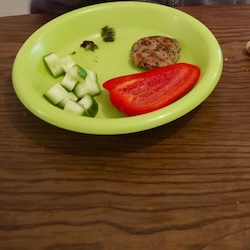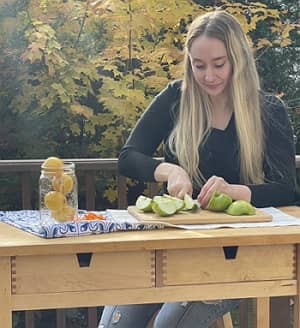Balancing your preschooler’s meals doesn’t have to be a challenge—discover how to make healthy, balanced meals for preschoolers fun and easy! Follow these practical tips to ensure your child gets the essential nutrients for growth and development, all while enjoying their food.
Feeding your preschooler is an overlooked milestone that parents go through. Not only is your child rapidly growing, both physically, cognitively, and emotionally, but they are developing their own tastes and preferences when it comes to food. This can make food choices and mealtime quite stressful for the family – leaving parents desperate to figure out what types of meals preschools will enjoy. Is there even anything!?
So instead of feeling like you need to spend hours on ChatGPT and in Facebook groups, searching for the answers and the most unique ideas, let’s break it down and find the meal ideas that work for you and your family.
Contents
Set Up the System
Preschool nutrition is key to supporting growth and development, so creating a set menu that meets their needs while incorporating your family’s favorite meals can help establish predictability and reduce the burden on you.
Focus on finding a rhythm with meal planning, shopping, prepping, and cooking. This becomes your system, with your family as your support network. Everyone should be involved—whether it’s deciding what’s for dinner, putting the groceries away, or setting the table. When everyone takes part, it promotes a positive attitude towards meals and teaches children valuable lessons in independence and responsibility for their food—skills that will benefit them as they grow.

The Nutrition Basics for Your Preschooler
Macronutrients for Preschoolers
Just like adults, preschoolers need a balanced intake of carbohydrates, protein, and fat.
Protein for Preschoolers
Protein plays a vital role in supporting growth and tissue repair during this critical stage. Preschoolers require about 2 servings per day of meat and other proteins*. Protein foods for preschoolers include:
- Grass-fed red meat, pasture-raised poultry, and wild-caught fatty fish (e.g., salmon) – A serving for children ages 1–6 is approximately 1 ounce.
- Pasture-raised eggs – For children ages 1–3, one serving is ½ hard-boiled egg, while for ages 4–6, it’s 1 hard-boiled egg.
- Organic, grass-fed dairy – Preschoolers need 2–3 servings per day of whole milk, Greek yogurt, or cheese. A serving of milk for ages 1–6 is approximately ½ cup.
- Beans – A plant-based protein option, though also a complex carbohydrate. A serving is ¼ cup for ages 1–3 and ⅓ cup for ages 4–6.
Carbohydrates for Preschoolers
Carbohydrates are essential for meeting the high energy needs of preschoolers and provide essential nutrients like fiber . Options for carbohydrates to include in your preschoolers’ menu:
- Aim for 6–11 servings of whole grains per day. For children ages 1–3, one serving is approximately 2–3 crackers, while for ages 4–6, it’s 3–4 crackers. Other grain sources include rice, pasta, bread, and legumes.
- Preschoolers should also have 2–3 servings of both fruits and vegetables per day. One serving of fruit is approximately ½ piece of fresh fruit, while one serving of vegetables is about ¼ cup of cooked vegetables for children ages 1–6.
Fats for Preschoolers
Fat is crucial for brain development in preschoolers and should be included in all meals and snacks in a moderate amount. Focus on fat sources like:
- Avocados
- Nuts, seeds,
- Olives and olive oil
- Fatty fish
- Eggs
- Grass-fed butter
Micronutrients for Preschoolers
For preschoolers in rapid development, it’s crucial to meet their micronutrient needs as well. Incorporating a variety of foods, especially fruits and vegetables, will help ensure these needs are met. Some of the important vitamins and minerals for preschoolers include:
- Vitamin A
- Vitamin C
- Vitamin D
- Calcium
- Iron
The goal is to create balanced meals for your preschooler to ensure they get all the nutrients they need. A colorful, diverse plate with the right proportions helps support their growth and development.
How to Build Your Preschooler’s Plate
Keep It Colorful
When building balanced meals for preschoolers, focus on incorporating a variety of fruits, vegetables, whole grains, proteins, fats and calcium-rich foods.
- Make the plate colorful and inviting to encourage your child to enjoy their food.
- Serve meals in age-appropriate portion sizes, whether on a sectioned plate or in a sectioned to-go container, to ensure your child gets the proper nutrients in the right amounts. Help your kids learn to listen to their hunger and fullness cues by serving them appropriate portions and encouraging them to pay attention to their body’s signals.
Choose Natural Products
Limit processed and ultra-processed foods like soda, candy, store-bought baked goods, snacks and chips, which can be high in salt, sugar, and additives.
Instead, opt for whole, fresh, and minimally processed ingredients such as which provide more nutrients for your growing child and allow their bodies and brains to learn natural flavoring and provide the nutrients expected to receive.
Avoid Sugar-Sweetened Beverages
Encourage beverages like water and milk. Avoid sugar-sweetened beverages and limit juice. Water should be the main drink for hydration, and milk is an excellent source of calcium and vitamin D to support your child’s growth and bone health.
Getting Ahead of Common Challenges
Include Everyone In the Process
Although it may be easier to just “do it yourself” rather than involve your child and slow down the process, consider finding opportunities to include them. Whether it’s bringing them along for grocery shopping or letting them be your sous chef in the kitchen, these small moments build valuable skills. As they grow, they’ll become more independent and proactive in preparing their own meals.
Make Mealtime Enjoyable
Mealtime can easily become a struggle for parents, creating a high-pressure situation that detracts from your child getting the nutrients they need. Instead, focus on making mealtime fun and enjoyable for your preschooler. Get creative with meals by trying new and exciting ingredients and involve your child in meal planning and food preparation. This can help foster a positive relationship with food.
Establish a consistent routine by setting a family meal schedule and a menu to introduce regularity, helping your child become familiar with their healthy eating routine.
Encourage Preferences
Your child may develop selective eating habits, which can affect mealtimes. Be patient and continue to introduce new foods to selective eaters while offering them choices. This allows them to explore all options without feeling pressured. Avoid forcing them to eat, as this can lead to negative associations with food. Instead, make mealtime a low-stress opportunity for your child to discover healthy foods.
Key Takeaways
- Feeding your preschooler is a major transition that comes with challenges, as they develop tastes, preferences, and independence.
- Creating a predictable meal plan that meets nutrition needs while incorporating family favorites can reduce stress and make mealtimes smoother.
- Preschoolers need a mix of protein, carbohydrates, fats, and essential vitamins and minerals to support growth, brain development, and energy needs.
- Serving age-appropriate portions helps children learn hunger and fullness cues while ensuring they receive the right nutrients.
- Prioritize fresh, minimally processed foods and limit sugar-sweetened beverages, processed snacks, and ultra-processed foods.
- Engaging children in grocery shopping, meal prep, and mealtime routines fosters independence and builds a positive relationship with food.
- Reduce stress by creating a relaxed environment, allowing children to explore new foods, and maintaining a consistent routine.
Feeding your growing family is no easy task—it can feel like you’re constantly struggling to find a rhythm. That’s where Dining With Nature comes in, helping you discover meals that suit your family’s preferences while meeting their evolving nutrition needs.
To learn more about what Dining With Nature offers for family nutrition care – hit the Explore The DWN Programs button below or take a look at our Services page.
Disclaimer: The information in this post is for general educational purposes only and should not be considered personalized medical advice or a substitute for professional guidance. Always consult with your doctor or a registered dietitian before making any changes to your diet, lifestyle, or supplement routine.

